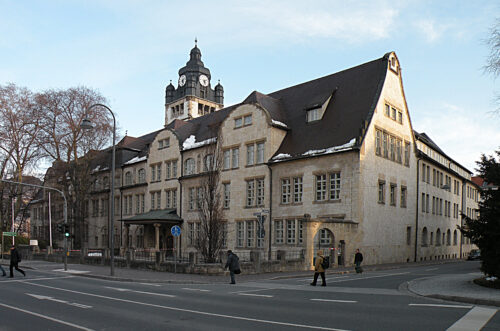Midtown Manhattan with the Empire State Building and Lower Manhattan with One WTC (background).Jack Barsky worked as a sleeper agent / illegal for the KGB in New York City. Photo: Dllu / CC BY-SA 4.0 DEED.
The world of espionage is a fragile web constructed of lies, deceit, and betrayal held together by …….. trust.” — Jack Barsky
Jack Philip Barsky (born Albrecht Dittrich on May 18, 1949) was a German American author, IT specialist and former operative of the KGB who spied on the United States from 1978 to 1988. He was an illegal who operated deep undercover.
He was born in Reichenbach, Upper Lusatia, East Germany, shortly after the partition of Germany, and grew up in Jena. His father was a schoolteacher and a staunch Marxist-Leninist. He had a younger brother named Günther. He attended boarding school at the age of 14 and later earned a degree in chemistry at the University of Jena.,
He was recruited by the KGB in 1969 when he was a senior at the university and a member of the East German Communist Party. He was approached by a Stasi agent who pretended to offer him a job at VEB Carl Zeiss Jena, but then revealed his true identity and asked him to join the KGB. He was given 24 hours to decide, and he accepted the offer out of curiosity and ideological conviction.

The Stasi was the East German Ministry for State Security, which was established in 1950 and modeled on the Soviet secret police. The Stasi was notorious for its extensive network of informants and surveillance of the country’s population. The Stasi also acted as a proxy for the KGB to conduct activities in other Eastern Bloc countries, such as Poland, where the Soviets were despised. The Stasi had its headquarters in East Berlin, with an extensive complex in Berlin-Lichtenberg and several smaller facilities throughout the city. Erich Mielke, the Stasi’s longest-serving chief, controlled the organization for 32 years (1957–1989) of the 40 years of the GDR’s existence.
The KGB was the Soviet Committee for State Security, which was established in 1954 and dissolved in 1991. The KGB was responsible for foreign intelligence, counterintelligence, internal security, political repression and state terrorism. The KGB had its headquarters in Moscow, at Lubyanka Square and Yasenevo Complex. Yuri Andropov, who later became the leader of the Soviet Union, was the longest-serving chief of the KGB (1967–1982).
Barsky was working as an assistant professor and working on his doctorate in chemistry at the University of Jena when he was sent to East Berlin for several weeks of training with the KGB.
He was working as an assistant professor and working on his doctorate in chemistry when he was sent to East Berlin for several weeks of training with the KGB. After this initial training, he was sent to Moscow in 1975, where his English was evaluated, and he underwent two years of additional training. He also wrote dozens of letters to his family in advance that were mailed periodically from Baikonur Cosmodrome, a top-secret facility that was home to the Soviet space program. where he had told his family he was working.
He received a false identity as Jack Philip Barsky, based on the birth certificate of a deceased American boy whose name was found at a Jewish cemetery in Maryland by KGB agents. He was also given a backstory that his mother had been German to explain his occasional accent. He arrived in the United States in 1978 with a Canadian passport under the name William Dyson. He flew in via Mexico and landed in Chicago. He then moved to New York City, where he worked as an IT specialist at MetLife Insurance, while secretly gathering information for the Soviet Union.

His assignments included identifying potential KGB recruits, filing reports on Americans’ reactions to current events, such as the Iran hostage crisis and the Reagan administration’s policies, and transferring US computer programs to the Soviets. He received radio transmissions from the Soviets every week and spent hours decoding messages. He hid photos and documents in small canisters and left them for the KGB in dead drop locations around New York. He also married an undocumented immigrant from Guyana named Penelope in 1985 and had two children with her: Chelsea and Jessie. He lived a double life, hiding his espionage activities from his American family and friends.
In 1988, he received a radio message from the KGB ordering him to return home, because they suspected that his cover may have been compromised by a former KGB archivist who defected to Britain and revealed the names of many Soviet spies, including Barsky’s. He did not know the reason for their suspicion, and he never found out. He ignored their first message and received another one with an ultimatum: “You must come home or else you are dead.”
He deceived his superiors by falsely claiming he had been infected with HIV and had to remain in the United States for medical care, exploiting the KGB’s dread of HIV/AIDS spreading in the Soviet Union. He assured them he would never betray them.
He got caught after the Cold War as a result of the defection of Vasili Mitrokhin, the former KGB archivist who defected to Britain in 1992. Mitrokhin had smuggled thousands of documents from the KGB archives that contained information about Soviet spies around the world, including the name Jack Barsky. Mitrokhin shared his documents with British intelligence, who then passed them on to their American counterparts.

The FBI tracked down Barsky in Mount Bethel, Pennsylvania. in 1994. They observed him for three years, even buying the home next to his and bugging his house. An FBI agent moved into the house next door to monitor his movements.
Barsky was on his way home one evening when a state trooper stopped him. He thought it was a traffic violation, but it was actually a trap set by the FBI. They had been listening to his confession of being a spy during a heated argument with his soon-to-be ex-wife, which he didn’t know was recorded by the FBI.
He agreed to cooperate with the FBI and told them everything he knew about his KGB career. He revealed details about his training, assignments, contacts, methods and motives. He explained that he decided to stay in the United States because he had grown attached to his American family and had lost faith in the Soviet system. He also expressed remorse for his actions and offered to help the FBI in any way he could. He was interrogated for several months and then allowed to remain in the United States as a free man. He became a naturalized citizen in 1997 and changed his name legally to Jack Philip Barsky in 1998.
He divorced Penelope in 2001 and married Shawna Hempel, an American woman, in 2002. He had another child with her: Trinity. He wrote an autobiography titled Deep Undercover: My Secret Life and Tangled Allegiances as a KGB Spy in America, which was published in 2017 by Tyndale House Publishers. He also appeared on CBS’s 60 Minutes in 2015 and on FX’s The Americans in 2017 as himself. He frequently speaks on his experiences and as an expert on espionage.
Resource
Jack Barksy Website
JackBarsky.com
*The views and opinions expressed on this website are solely those of the original authors and contributors. These views and opinions do not necessarily represent those of Spotter Up Magazine, the administrative staff, and/or any/all contributors to this site.
